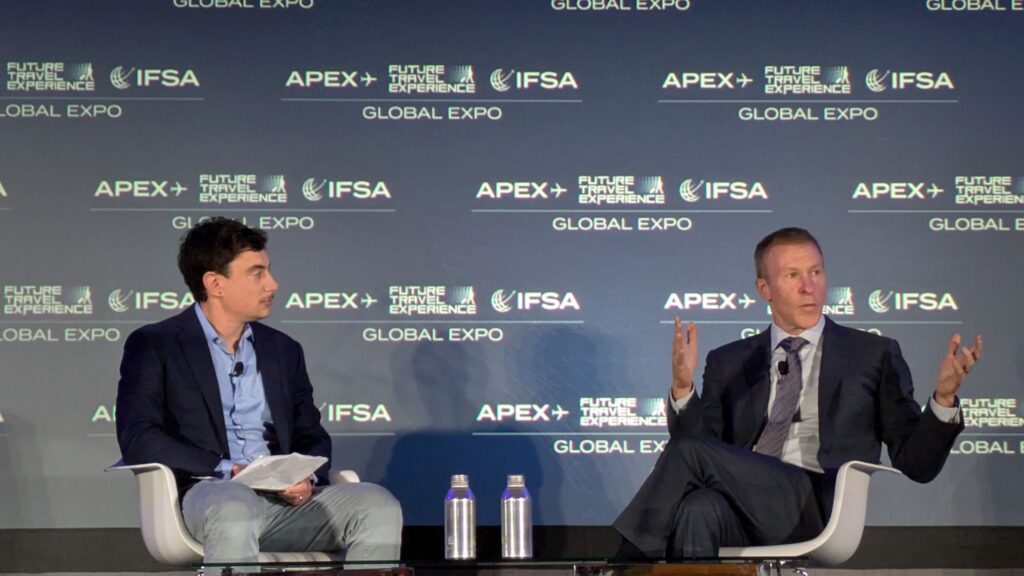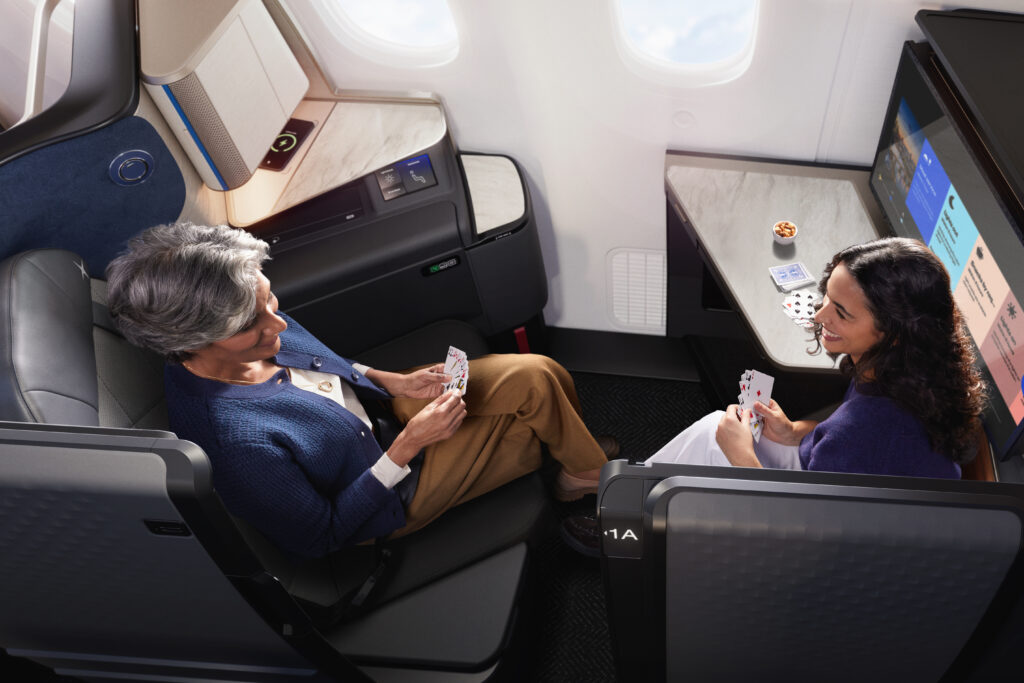
US airlines are spectacularly good at getting what they want from the government. A big part of that comes from being strong economic engines across a range of legislative districts, covering the political spectrum. Similarly, strong union membership helps drive policy at the federal level.
Recent years have also shown airlines to be increasingly effective at talking in terms that echo government positions. This week at the APEX Global Expo in Long Beach, CA United’s Scott Kirby took a stab at that during a keynote interview with Brian Sumers, with impressive success.
On the political front, Kirby described a “trade deficit” of international air travel, parroting the Trump Administration’s phrasing, and justification, that delivered the current tariff situation.
Kirby’s justification there comes across as the “fair share” argument used by many airlines:
We’re starting to think about how we move beyond this competition with the US airlines, to the global stage more, without government funding. Two thirds of the long haul international seats coming from the United States are foreign flag carriers, even though 60% of the passengers are US citizens*. So we have a huge trade deficit in air travel, long haul, international travel.
There are lots of reasons for that, but at its core the biggest reason is, by and large, international airlines are quasi arms of the state. They have various forms of state subsidy that allows them to fly a lot more seats, and they don’t necessarily have to do it profitably. We have to be profitable.
Presumably any political action on this front would manifest as a pull back from open skies arrangements, with caps imposed on foreign operators to match what US carriers see as their fair share to those markets. That’s almost certainly not good for passengers; less competition rarely is. And US carriers cannot scale up fast enough to backfill if foreign operators were shut out. Aircraft simply are not available.
It is also not clear how effective the policies would be, especially as US carriers have partnerships with many of the theoretically offending airlines. The US3 basically gave up on this fight years ago, and United has strong partnerships with TATL and TPAC partners in Star Alliance, plus Emirates. But he said it.
Product Drives Profit
Kirby also suggested at two different points in the conversation that United’s focus on product, including the new, not-quite-first-class Polaris Studio offering, is part of that battle. “The next step for us, and we don’t have the answer yet, is to figure out how to be truly competitive on the global stage, to have a product that customers, when they’re flying to the Middle East, they’d rather fly United Airlines.”

Kirby acknowledges that “today, we’re behind on some of that product stuff. But it is not as simple as just putting the product on, because we have to do it profitably.” Instead, he suggests Polaris Studio is a “baby step” into what delivering a premium product looks like. But he reiterated the position that United “looks at the map for some of these international [airlines] that have really, really nice first class, we’re pretty sure – we actually know – they lose money. They don’t care, but they lose money, and we can’t do it that way.”
Ultimately, he believes there’s an opportunity, or at least a need, to “create an airline that all Americans can be proud of and think is the best airline in the world.”
Kirby also emphasized he’s willing to spend some money, investing to de-commoditize the passenger experience. He argues a growing population of brand-loyal travelers are willing to spend more if the product justifies looking beyond just price and schedule.
But he’s also not obsessing about exactly how the money is spent. Yes, there is a budget, but there is also a mission to invest, even if the exact numbers cannot be rendered on a P&L sheet:
You can’t prove that that $50 million drives $1 more revenue or drives, but when you put that and all the other things we’re doing together it does.
Is $50 million more for food going to, on its own, pay for itself? The answer is no. But when we do that, and we’re also going to invest in technology, we’re going to do all this other stuff. The whole is greater than the sum of the parts.
To that end, Kirby also notes that he is not cutting the budget for passenger-facing product. Instead, as the company moves through that process for 2026, United is increasing customer investment. And he’s trusting the department heads to know how to spend that money, foregoing his typical spreadsheet focus. “Every year we’re going to consciously spend more for customers, and we’re not going to do a spreadsheet analysis… Some things are just math, and some things are much more intuitive.”
Which is not to say that the department heads aren’t using spreadsheets to sort things, but there’s at least some room for vibes in the process.
Will it work? We’ve gone through a few cycles of removing amenities and airlines are mostly still in business. And both United and Delta, the other carrier Kirby believes is meeting this challenge, are financially strong these days.
Still, this is a cyclical industry. And when cuts eventually come, whatever they are, it will be fun to revisit whether the decision was made with a spreadsheet or intuition.
* My query of Cirium data for the past 12 months says ASMs are split ~60/40 foreign/US while seats are almost exactly even. So the discrepancy he’s pitching might not really exist. Oopsie.
More news from APEX Expo 2025
- Panasonic Avionics, Intellian team for LEO ESA Terminal
- FlightPath3D Launches Destination Stories to Boost Passenger Engagement
- PaxEx PR: Neo Space Group (NSG) to Acquire Display Interactive, Setting New Standards in In-Flight Connectivity for Airlines and Passengers
- Seamless Air Alliance Publishes Antenna Buyer Handbook to Assist IFC Decisions
- LEO-Only for the Future or a Stop-Gap? Digging in to the PAC/Intellian ESA Deal
- JetBlue to Deploy Quvia Grid for Next-gen IFC Management
- United’s Kirby Pitches Political Angle, Product Investment for Growth
- Riyadh Air Picks FlightPath3D for Inflight Map
- Sun Country Plans Inflight Wi-Fi, Just Not Yet
- Reliability, then Product, on Breeze’s Agenda
- Gossiping Around the APEX Water Cooler
- All in the Family: Anuvu Talks Future of Inflight Connectivity
- BAGTAG Adds Airport Kiosk Integration with Amadeus
A favor to ask while you're here...
Did you enjoy the content? Or learn something useful? Or generally just think this is the type of story you'd like to see more of? Consider supporting the site through a donation (any amount helps). It helps keep me independent and avoiding the credit card schlock.

Leave a Reply